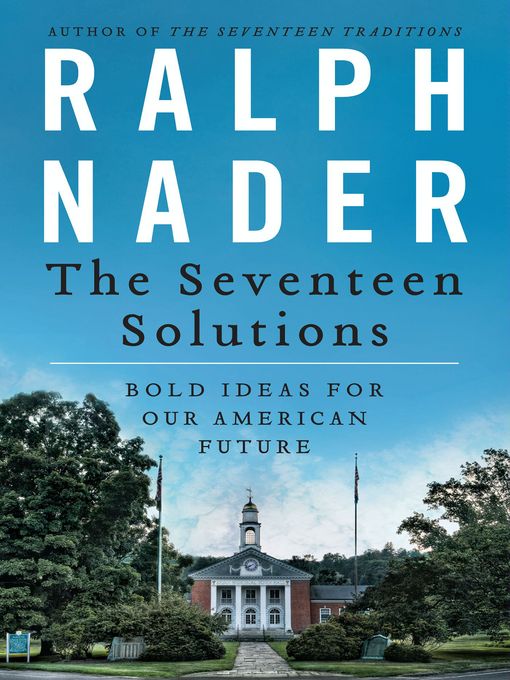
The Seventeen Solutions
New Ideas for Our American Future
فرمت کتاب
ebook
تاریخ انتشار
2012
نویسنده
Djuna Barnesنویسنده
Djuna Barnesنویسنده
Ralph Naderناشر
Harper Paperbacksشابک
9780062083548
کتاب های مرتبط
- اطلاعات
- نقد و بررسی
- دیدگاه کاربران
نقد و بررسی

July 30, 2012
Consumer advocate and former presidential candidate Nader shares his progressive, humanitarian ideas for how to improve American lives in an era when corporate profits are skyrocketing, but American workers and their families are poorer than they’ve been in decades. Taking on corporate crime, tax reform, civil liberties, and alternative energy, among other topics, Nader emphasizes how “a shift in power from the few to the many” will lead to more fairness, less corruption, and economic stability. He urges Americans to break the stranglehold of gigantic corporations by cracking down on their subsidies, tax loopholes, and corporate crime. In addition, he advocates for a tax on Wall Street speculation and federal charters for U.S. corporations that would empower shareholders, require companies to observe union rights, and abolish “the legal fiction” that corporations are people. Nader is most effective when he urges Americans to re-engage with civic life, retake control of the public airwaves, and become consumer advocates and congressional watchdogs, and he offers practical advice for doing so. He is less convincing when calling on Congress to impeach the current and former presidents for the unauthorized wars in Libya and Iraq, or when he tries to link the violence in video games to rising youth crime. But overall, Nader’s passionate ideas should resonate with all concerned Americans.

August 15, 2012
Third-party presidential contender and environmental activist Nader (Getting Steamed to Overcome Corporatism, 2011, etc.) offers "an attempt to start a new conversation about our problems." In a follow-up to The Seventeen Traditions (2007), the author reiterates his defense of civil liberties, environmentalism, anti-corporatism and anti-militarism, and calls for renewed civic engagement and activism. He appeals to the legacy of Madison and Jefferson, as reflected in his defense of small-town communities capable of supplying their needs through their own efforts. Though he advocates for cuts in defense spending, Nader supports the military's globally significant medical research in combating yellow fever and malaria, and he is grateful for its contribution to his own initial work on automobile safety. He would now like to see the military contribute such skills to water safety and food preservation. Nader's legal background shapes an interesting discussion about the history of corporate charters in the United States. He shows that the right to form corporations through state-level charters was originally specific to a particular purpose, and the modern corporate form, with eternal life, limited liability and general capacity, results from willful political transformations. This discussion gives a sharp focus to an otherwise diffuse narrative about the dangers of corporate greed. The author also charges that President Obama "has exceeded Bush's lawless example" with his war in Libya; the Bush administration "was a dress rehearsal for its successor." Less a new conversation than a restatement of an older agenda.
COPYRIGHT(2012) Kirkus Reviews, ALL RIGHTS RESERVED.

October 1, 2012
Twelve years after his role in the 2000 presidential election and nearly 50 since Unsafe at Any Speed (1965) shocked the U.S. auto industry, Nader remains a font of ideas about all that ails the U.S. economy and the U.S. polity. No reader will be surprised that corporate America is the focus of many proposals, among them eliminating corporate welfare, cracking down on corporate crime, establishing national charters for the largest corporations, and cutting the military budget. Anyone who's followed Nader's career will also expect his advocacy for political changes, including restoring civil liberties, reinvesting in infrastructure, and forcing Congress to have Skin in the Game. But many of Nader's solutions require action by ordinary citizensreengaging with civic life, building more self-reliant communities, taking back control over science and technology, and watchdogging Congress. Notably, Nader urges enlisting support from the enlightened super-rich to generate the modest but essential funding needed for campaigns to turn his other recommendations into reality. Timely, relevant ideas from a veteran of generations of battles for small-d democracy.(Reprinted with permission of Booklist, copyright 2012, American Library Association.)

























دیدگاه کاربران